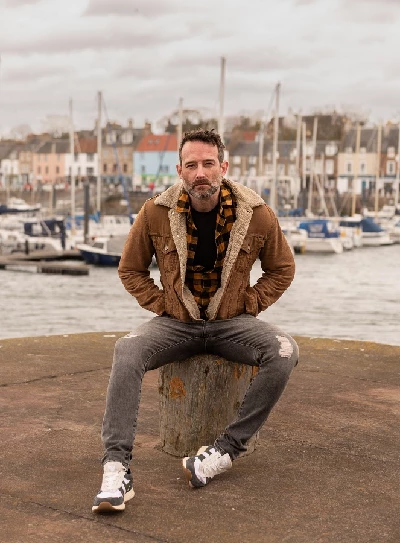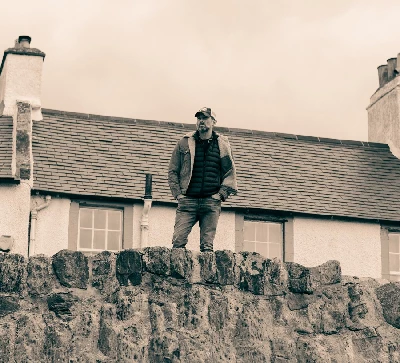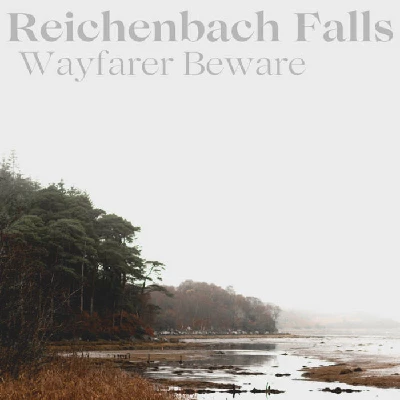published: 17 /
4 /
2025

Abe Davies, the frontman with Reichenbach Falls, talks to John Clarkson about their new album, 'Wayfarer Beware', which is a concept album about a break-up, set in New York State and Scotland.
Article
Reichenbach Falls is the musical project of Abe Davies, a British-Canadian singer-songwriter and guitarist.
Davies began Reichenbach Falls in Oxford in 2010 and recorded its first two albums, ‘Reports of Snow’ (2011) and ‘The Traitor Shore’ (2015) , there with former Viarosa frontman Richard Neuberg and several other musicians at Neuberg’s Strawhouse Srudios.
A move to St Andrews in Scotland where he lectures in Renaissance Literature has brought about something of a change in direction. ‘The Past May Be Dead But Its Nails Still Grow’ (2021) the collective’s third album, was recorded remotely by Davies and a widely located but small group of friends as a lockdown project,.
‘Wayfarer Beware’, Reichenbach Falls’ fourth album, takes this concept of making music at a distance further being recorded with just one other musician, Vancouver-based producer Jon Anderson. Davies sung and played the acoustic guitar and wrote the tunes and lyrics, and then Anderson embellished on these and created full arrangements, using a multitude of different instruments over the eleven tracks of ‘Wayfarer Beware’, including drums, piano, electric guitars, bass and double-bass, pedal steel and vintage synthesisers.
‘Wayfarer Beware’ is a record for winter, and the cold, the dark and snow are regular presences on its lyrics with Davies revealing a sharp, poetic eye for the wilderness and natural detail. “I watched the snow turn grey on the tracks as they just disappeared behind us,” he reflects on ‘Gone As Sure as Trains’ on this concept record, a break-up album, as its hapless protagonists drift North through New York State on a train to a last holiday in an isolated log cabin. “I can tell I have touched your face for the last time,” sings a hurt Davies later on that track, as the freezing, remote landscape they find themselves trapped in destroys anything left between them.
“I wouldn’t wish this fucking cold on anyone,“ sings Davies on the next track. ‘The Cold, The Snow’. Rosie, their small daughter, meanwhile, is devastated at her parents’ disintegrating relationship, adding guilt to am already large wound. “Rosie says, ‘You could have tried better.’”
Davies is excellent at capturing and portraying the confusion and anguish of a man who has put everything into his romance, but has been outdone by his own mistakes and a succession of differences from his partner.
He is matched in this by Anderson, who brings real weight and fire to the arrangements – a rush of spiraling electric guitars to ‘Gone as Sure as Trains’, a flurry of hazy, spooky electronica to ‘The Cold, The Snow’ and whispering chimes and synths to ‘A House Back in the Woods’.
The penultimate track, the gently breezy and balladic ‘Hey Rosie’ finds Abe Davies’ character back in Scotland, and isolated from his daughter but wiser, (“Hey Rosie, I am sorry I let your your mother down (“We both thought that I was more than I really was.”)
The last song, the hymnal ‘Winterhead (Hudson River Lighthouse)’ built around a steadily building organ, hints, however, at possible reconciliation and ends the album on a note of potential hope (“At the lighthouse, where the Hudson River bends, I’ll wait for you”).
Pennyblackmusic spoke to Abe Davies about ‘Wayfarer Beware'.
PB: You provided the acoustic guitar work and vocals and then handed it over to Jon in Canada to provide the rest of the instrumentation. Why did you decide to work with Jon on ‘Wayfarer Beware’? How much of a free rein did you give him? Did you use much of a vetting process?
AD: I gave him pretty much total free rein. I’m a big fan of his band Jonathan Inc and other projects he’s worked on, and the experience of working with him on ‘The Traitor Shore’ in 2015 had made me think we could collaborate more extensively. He only mixed that record, but also added little touches here and there – an organ, a piano part, just sonic stuff – that made me want to find out what he’d bring to my songs if really turned loose on them. So we’d kind of stayed in touch over the years, and when these new songs started to come together one thing led to another. Pretty miraculously, even when he took a song in a direction I couldn’t have imagined, after a couple of listens I was always like, ‘Oh yeah, that’s what the heart of the song was, I just didn’t know it yet …’
PB: Jon runs a studio in Vancouver and was able to record his instruments? What kind of set-up did you have in St Andrews in contrast and how easy or difficult was it to tie it up with Jon’s studio in Canada?
AD; Ha! You’d have to ask him, really. I have a small set-up at my place: a beautiful Gibson acoustic, a couple decent mics given to me by my good friend Richard Neuberg – nothing special, but enough to record finger-picked guitar and quiet-ish vocals to a decent standard. And Jon’s place – Protection Island – is a full-bore, fully equipped residential studio, so with his skills I think my fairly basic recordings weren’t too hard to integrate. Or maybe they were and he’s too nice to say. Either way, it got done, so I’ll let sleeping dogs lie.
PB: Your first album ‘Reports of Snow’ was another break-up album and is also in part autobiographical. This album is told from the perspective of both you and your ex. Why did you decide to broaden things out? How did your ex feel about being given a voice on the record?
AD: Partly I think I was just wary of retreading old thematic ground too much, but at the same time was stuck with the songs I was writing, so the idea of expanding the storytelling perspective seemed an interesting way to go. After a couple of songs were written I started to think of it as a screenplay, or a series of connected short-stories. As for how she feels about it – I don’t know exactly, but she told me she loved the record in general, and at this point she doesn’t really have any reason to lie …
PB There is a third character, their daughter, Rosie, who does not really exist. Why did you create an imaginary daughter? Do you see Rosie as both being a sort of Greek Chorus and mediator?
-
AD: Huh, the idea of the Greek chorus is interesting. I suppose that’s true, especially in the sense of how in Sophocles or Aeschylus the Chorus can often seem so sad and dismayed about how this awful story is unfolding in front of them yet there’s no way to stop it. But much as I’d like to say it was a carefully worked-out strategy, it really wasn’t. Rosie was just the name I’d imagined for our kid if we’d had one, and once she’d spontaneously worked herself into one song it seemed like another way of building out the broader narrative into something more interesting than just me being bummed-out.
PB: The couple travel to upstate New York in winter in the first half if the record, and live in a house in the back of the woods. How well do you know that area? You do a beautiful job of describing its raw beauty but how “fucking cold” it is there. Do you think that they would have stood more of a chance if they had remained in the city?
AD: I know that part of the world a little bit, partly from summers when I was a kid and partly from spending time with my ex there. There’s also a lot of Scotland in the record, so it’s kind of moving between the three different locales. Do I think different geographical luck could have changed anything? That way madness lies.
PB: The album, while melancholic, finishes on a note of possible reconciliation at the Hudson River Lighthouse. Was it important for you after all this sadness to end on a note of rebirth and hope?
AD: Yeah, it was. There’s an irony to it, though, because that song was the first to be written, kind of at a more optimistic stage. So on the one hand I like the record finishing with a sense of hope, and on the other there’s also a little dark joke in there too, because all the sadder stuff really came after that song. But that aside, it’s nice to imagine better endings than we often get, right?
PB: You used to play a lot of gigs when you lived in Oxford under the moniker of Reichenbach Falls both as a band and a solo artist. Edinburgh and Glasgow are not too far way from St Andrews, and you would think the indie clubs and bars would be very keen to get you on their bills. Why have you done so much less live work in recent years?
AD: Man, I just kind of fell off that horse and never got back on! I’d be open to playing some shows, and did used to enjoy it on a good night, but the real attraction to me was the process of writing the songs and then working with my friends in the studio to make something beautiful out of them. Plus then I moved away to somewhere relatively isolated (Edinburgh’s over an hour, Glasgow over two) and was busy with my doctorate and teaching and writing my book and all that stuff, so all the faff of the live thing, fun as it could be, just got shuffled down the list of priorities. But as I say, I wouldn’t be averse to getting out and playing some small shows. Only Christ knows if there’d be any audience for it, of course.
PB: 'Wayfarer Beware’ would make a wonderful vinyl release. Why have you restricted things to digital so far? Do you plan a CD or vinyl release?
AD: I’d love to get some vinyl pressed of this record, I really would. But the economics of it are … not great. I’m really happy that there are still people out there who value a new Reichenbach Falls album – not least you good folks at Pennyblack, which has been an amazing champion for our stuff over the years! But it’s a pretty small listenership at this stage and with the price of vinyl I’m just not confident we’d even recoup costs on it. Maybe if I get a few gigs lined up next year! Similarly with CDs, actually, but I think there’s a more realistic prospect of that. Watch this space …
PB: Thank you.
Band Links:-
https://twitter.com/rbachfalls
http://www.reichenbachfallsband.com/
https://www.facebook.com/ReichenbachFa
https://reichenbachfalls.bandcamp.com/
Play in YouTube:-
Picture Gallery:-

